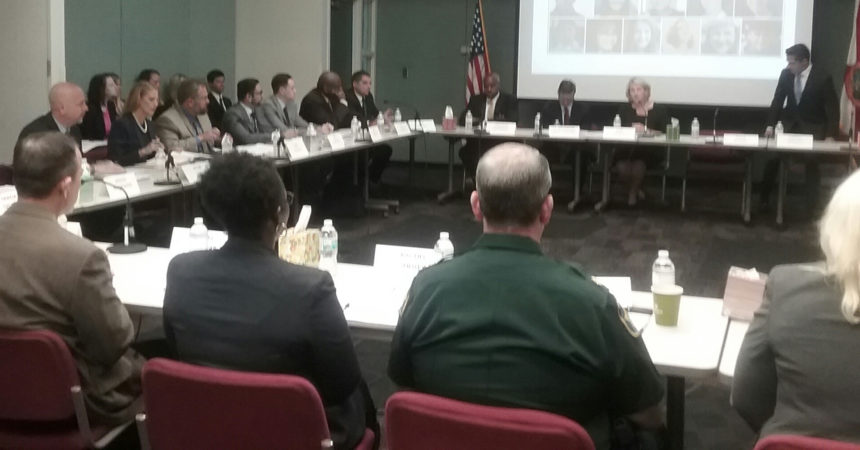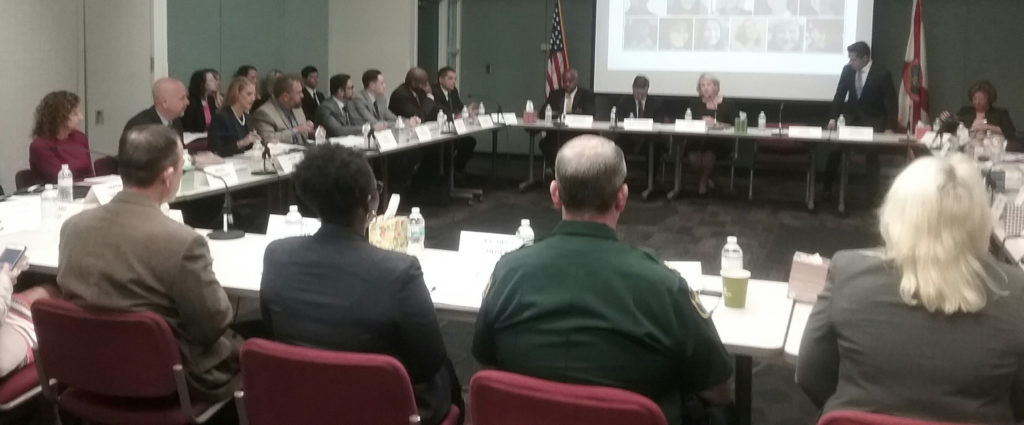
State educators seek answers to mental illness

Several education administrators from around the state sought answers to mental illness and gun at a recent workshop.
Photo by St. Clair Murraine
By St. Clair Murraine
Outlook staff writer
Education administrators from across the state spent the first two hours of a fact-finding workshop grappling with ways to deal with mental illness among school children.
The consensus among those who filled the large conference room – counselors, mental health specialists and attorneys — was that they aren’t allowed enough time to counsel students and the funding isn’t available even if they could find time.
Potential legal challenges by mentally ill students who have reached age 18 and their parents also was a concern as well as the ratio of students to counselors.
The daylong workshop came on the same day that students from Marjory Stoneman Douglas High School were protesting at the Capitol for tighter gun laws. The students were reacting to a massacre at their school that claimed the lives of 17 students.
Nikolas Cruz, suspected of carrying out the shooting spree, has since been deemed mentally ill. That, experts suggest, was the cause of Cruz’s attack on the school.
In search for answers to solve mental health issues among school children, Gov. Rick Scott hastily called the workshop. It was one of at least three fact-finding meetings that Scott called on the same day.
Finding solutions to help students with mental health challenges won’t be an easy fix, said Terry Nichols, a member of the Jackson County school board.
“It’s not like curing bronchitis,” said Nichols, who also is a healthcare professional. “It’s very deep. I would caution you in trying to treat and remedy.”
Miami-Dade superintendent of school, Alberto Carvalho, said 16 students in his district were the victims of random shootings. That set off a discussion on how easy it is for an 18-year-old to purchase a gun.
“This is bigger than simply preventing a mass shooting,” Carvalho said. “It is killing the young people with firearms.”
Rev. R.B. Holmes, publisher of the Capital Outlook, suggested that the process of checking the background of someone purchasing a gun needs to be overhauled.
“Why do we allow a person who is 18 years old to buy an AR 15,” Holmes asked. “That’s troubling. We just have to continue to try to find a system where we can monitor a person.
“The system is broken when it comes to trying to identify people who need mental help. We saw the example of someone being noticed and the system broke down.”
Some of the participants were blunt. Others, like Stoneman Douglas student Stephen Marante at times seemed frustrated. He was overcome with emotion when some of the difficulty in identifying troubled students was brought to the table.
He pointed to multiple failed efforts that would have prevented Cruz from using an AR-15 to attack his classmates.
“I’m hearing around the table that we need to do a better job building community, but we identified him,” Marante said. “Every single level failed; from the county to the state to the federal. We need to get better at identifying.”
Many of the school superintendents in the room said they are already involving law enforcement and state resource agencies to help their students.
Governor Scott apparently took many of their suggestions to heart, based on a proposal that he announced three days after the workshop. He called for more mental health monitoring, tighter gun control and hardening security at every school in the state.
His proposal, which he said will cost $500,000,000, might chump others such as Sen. Kathleen Passidomo (R-Naples), who called for a program that could help school districts in the state identify and treat mentally ill students early.
The protest by Stoneman Douglas survivors has also created a national debate on how to deal with the issues discussed at the workshop. Congress has been slow to act, prompting an outcry over many of its members’ ties to the National Rifle Association.
However, Congressman Al Lawson said his colleagues are at a point where they have no choice but to act on a gun-control bill. The shooting at Stoneman Douglas and other recent massacres should be enough reasons, he said, pointing specifically at the shooting in Parkland.
“I think what it has done is force politicians to the table to not just give lip service, but to take action; especially when it comes to assault weapons,” said Lawson, who was in Tallahassee for a Black History event.
He commended the action of the student who protested in Tallahassee and had support around the country.
“The young people aren’t going to let it stop,” he said of the movement they’ve inspired. “They lost their friends and now it opened the wounds of all those other people who have been hurt in Nevada and Columbine.”







